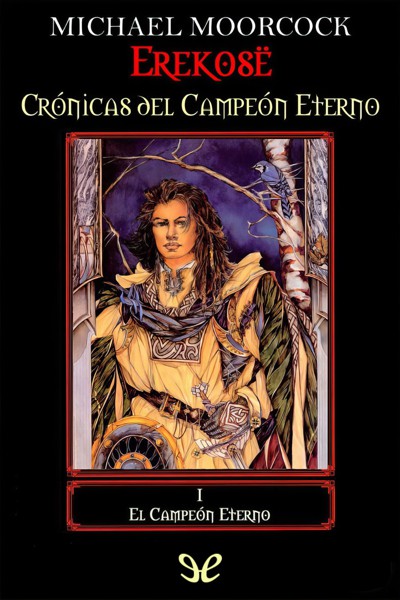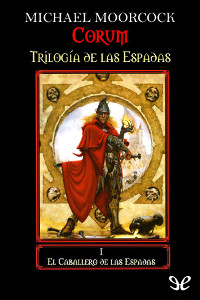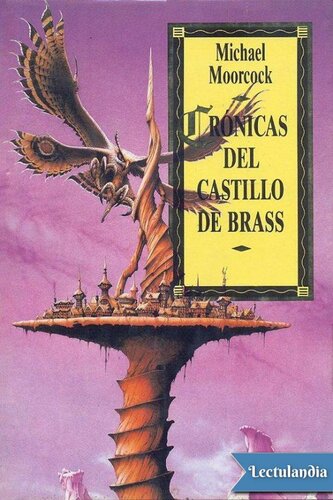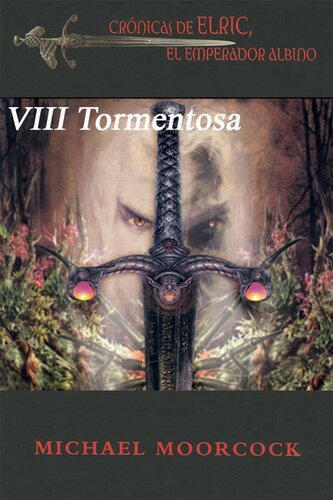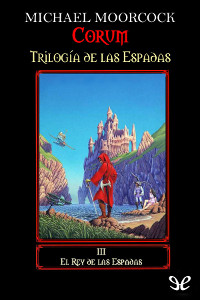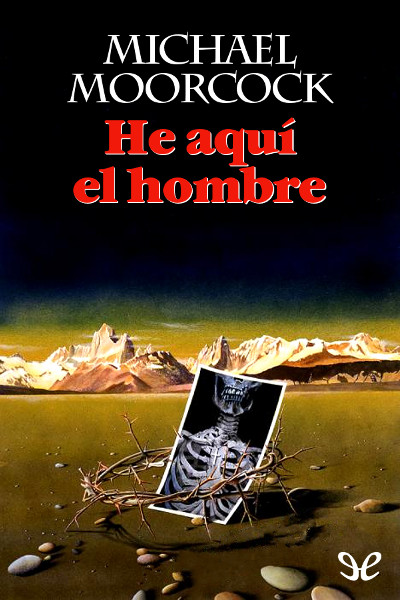oleebook.com
The Woods of Arcady de Michael Moorcock
de Michael Moorcock - Género: English
Sinopsis
A wild desert crossing, a secret island paradise, a hidden underground civilization, plus London and Paris. The multiverse expands as pulp adventure mixes with unreal memoir in the second volume in The Sanctuary of the White Friars series.
In the 1970s, Michael Moorcock, a writer of genre fiction, attempts to save his failing marriage by taking his wife and daughters to Paris. One night in a bar he is amazed to find himself drinking with heroes of story and history. The next day he awakens aboard a sailing ship, kidnapped into another reality by a French highwayman and the four Musketeers, who know Moorcock well from adventures in London's Alsacia...but that was another Moorcock, from another world.
Soon after they reach Africa, the company is rescued from an ambush by Antara, a poet-adventurer who offers to lead them across the desert and through several realities to the estate of Lord and Lady Blackstone. The trip is full of wonders Moorcock has read, dreamed, or...
Libros Recomendados - Relacionados
Reseñas Varias sobre este libro
This review originally published in Looking For a Good Book. Rated 4.0 of 5
Michael Moorcock is back (finally) with the second volume in his Sanctuary of the White Friars series (the first volume was released in 2014). These books have a real Moorcock vibe (much more evident to me now having recently read the entire Elric series) which is in some ways difficult to describe. This reads part biography, part fantasy and throughout I wonder - where does the biography end and the fiction begin? Sometimes it seems obvious, sometimes that line is very murky.
The story is about a man named Michael Moorcock ... a writer who, in the 1970's, wrote speculative fiction/fantasy and edited a genre specific magazine. His marriage is on the rocks and with hopes of restoring his family relationships, takes his wife and daughters to Paris.
One night, while having a drink in a bar, he is surprised to learn that he's drinking with heroes from history and, after maybe drinking a bit too much, he wakes up the next day on an old ship, kidnapped by the Four Musketeers who believe they know Moorcock - though it becomes obvious to him that it is a different Moorcock, from another realm or reality that has fought alongside the Musketeers.
They travel to and through Africa (as well as though different realities) simultaneously pursuing friends (Lord and Lady Blackstone) and being pursued (Jacob Nixer).
This is Moorcock doing what Moorcock does best - traipsing ... no, stomping ... through multiple realities and bringing together familiar individuals who might otherwise never meet. But it's the inclusion of a Michael Moorcock that teases and titillates the readers. This almost becomes a pulp adventure in which the original reader (a young Moorcock) now finds himself living the adventures he grew up with. It's kind of the ultimate biography if you're a bibliophile - to tell your story through the books that you grew up with.
But in Moorcock fashion, nothing just 'is'. Moorcock doesn't ever seem satisfied in spending time in one place and whether it's his 'Eternal Champion' (every hero he's ever written is actually one and the same, just working in different bodies in different realities) or himself, we readers need to be prepared to make sense of things that shouldn't otherwise go together.
It's been nearly a decade since I read the first book in this series, but my memory (and looking back at my review) of the story was that it was a bit more direct and energetic. This book feels much more an homage to the author's youth and the book he grew up with.
I wouldn't encourage this to readers not already familiar with Michael Moorcock, but for those who have read some of this Grandmaster of fantasy's work, this is a book to be enjoyed.
Looking for a good book? The Woods of Arcady by Michael Moorcock is the second book in the Sanctuary of White Friars series in which the central figure is a writer of fantasy by the name of Michael Moorcock. The blending of biography and fantasy creates a clever romp.
I received a digital copy of this book from the publisher, through Netgalley, in exchange for an honest review.
scifi-fantasy1 2 comments Clint Jones195 2
The mash-up genre of the The Sanctuary of the White Friars series continues in The Woods of Arcady. The space action aspect in the Second Ether setting is diminished. The swashbuckling Three Musketeers continues. The story this time is essentially a literary fantasy travel adventure in the style of H. Rider Haggard where Moorcock has injected himself as a character in order to include partial-autobiography.
The novel is wrapped in a web of references ranging from obscure pulp fiction to literary classics. The insight that these references offer (even if you've only read a fraction of them) is essentially decorative. Moorcock himself sums up the experience of reading The Woods of Arcady:
Linear memory doesn't work very well for me. I make associations a patchwork quilt. my mother, I seem to be rambling, but I come back to the point in the end. One patch here, another there and somehow the narrative begins to come together.
As with the first book, The Woods of Arcady suffers from repetition and meandering subjects making it difficult to focus when reading. The adventure story is picaresque. Moorcock is "kidnapped" because his writer's invention and sensitivity is needed for a great cause. The device allows him to wander into the odd autobiographical memory along the way. Moorcock's fans will ly get more out of the series than new readers, but those fans will continue to find facts, insights and aspects of the story to make it enjoyable.
Concerning the autobiographical aspects of the book, Moorcock provides amusing anecdotes and, of course, his personal philosophy:
I used to claim SF allowed you to learn how to write while selling your mistakes.
Through fiction, the stories and experience of others, we absorb and add to the pack memory. When fiction lies too well, it might be said to have failed. Fake views.
"We occupy one of those places where narratives are made and remade. We are the story and we are its tellers; everything the human mind makes from Chaos. And we are balanced on sturdy rocks. Sir James Jelinek called them 'fulcra', the original dramas in the sciences, arts and great endeavours upon which all our reality is built. The rest are mirror versions of those foundations, slowly distorting. But the tales vary only by a degree or two. Nothing is a lie. Nothing is strictly true. All Reality changes subtly according to the vagaries of distant neutrons. I give you the version we favour.
He reveals a simple origin of the Corum books:
The only book I had managed to buy was a Cornish-English dictionary. I couldn't find an English-Cornish equivalent. So I read it. By the end of the first week I was pretty well educated in basic Cornish, which became the basis for my Corum books.
Moorcock's fantasy is widely different from Tolkien's, and he has criticized Tolkien's work in the past. It may be a little difficult to find those details when you research it, but here he provides an explanation to help soften the criticism a bit once Moorcock makes his views clearer:
Tolkien reconstructed his ideal world just as the British had tried to make an English paradise in South Africa. Those dreams are always built on inequality.
Had so many died in terrible ways simply so the British Empire could extend its nostalgic Little England vision of the Shire?
I was suspicious of all who turned their backs on the city to find sweet escape in shires and ditches and even forests and mountains. I neither hated, feared nor despised them, for we choose our routes if not our roots, but I could not help mistrusting their understanding. In my eyes, part of my responsibility as an adult in a democracy was to inform myself about the world's issues and to take some action to affect a solution.
The Second Ether mythology storyline further develops the Spammer Gain:
Spiritually I identified it as our creator, our ever-present mother who loved us, loved for ever, cared for ever.
There are several situations where disputes are handled not with violence, but with balance, harmony, law and order. It's an interesting way for Moorcock (being fundamentally opposed to violence) to demonstrate those scenarios.
[The Off-Moo] lived beside lakes of mercury and were able to conjure beings giant rays into the air to spread themselves or rippling sheets of near-transparent silk to settle on two battling factions and carry them about until they stopped fighting.
That's not to say there isn't any fighting: he's still an adventure writer after all, steeped in a background of pulp fiction during its golden age! Even so he tempers the heroic action:
Many of the men around me had bloody clothing. I could smell human excrement and urine mixed with the stink of blood and powder. The smell, I remember being told once, of trench warfare. My terror grew. This was not a dream.
Moorcock takes advantage to contrast the peaceful monk, Brother Bertrand, to the puritan antagonist. Jacob Nixer. He ties it together with humor, and a touch of light philosophy that is relevant to recent events in America and its background:
"Two Christians, with nothing in common except the name of their prophet!"
... the Jake Nixers of the worlds: The insensitive, the incurious, the judgemental, the jealous, those with petty ambitions...
I remembered the Thanksgiving joke I used to tell about the board game I planned to market. 'Save America from her most terrible danger!!' The game was called SINK THE MAYFLOWER!
That sort of terrific humor laces other areas of the book, both autobiographical and fictional:
[Martin Whitehall, a fellow musician] was a sneak thief, too. You couldn't put a duffel down at the G without him stuffing it into his guitar case and leaving in a hurry. He stole his own coat twice.
There was an edge to [the White Abbess'] voice which could have cut off a man's head and him not know it until he nodded.
biographical fantasy Doug Piero73 1 follower
Think of VALIS, in which Horselover Fat is also the book's author, Philip K. Dick. Think of the novels of Kurt Vonnegut that feature Kilgore Trout as his alter-ego. Think of James Joyce and Steven Daedalus in Ulysses. Especially think of Ulysses, this is that sort of book.
Michael Moorcock is the major character in this novel. He tells us of his life, but drifts in and out of hallucinations that become ever more real. Much of the story at first tells us of his days working with Tarzan, and other boys' and girls' stories, meeting all the other science fiction writers, playing in Hawkwind, editing the New Worlds literary magazine. Moorcock coined the Multiverse, and the Multiverse begins to intrude on Moorcock's life faster and harder in a hallucinatory way. The Three Musketeers join him in travelling the worlds, accompanied by a stupendous cast of heroes and villains.
I have not yet finished, but so far it is one of the few 5 stars I have read lately.* UPDATE: I am finished now, and it is still 5 stars. So much genius and a perfect conclusion. This is a love it or hate it book, so fair warning.
As Moorcock says in ch. 30, "That's what I thought. The ravings of a madman, eh? Acid freakburn?"
This entire review has been hidden because of spoilers.Show full review20241 Dave219 7
I think I missed the point of The Whispering Swarm and after reading The Woods of Arcady I should probably re-read it, and this one again too. When an author has written and been published for seventy years or so, we are reading different people over different stages in a complicated life. Where the first book seemed cowardly and self-indulgent, maybe it was supposed to be. Here we find someone who has come to terms with a lifetime of flaws. Post Modern stream of consciousness with a rousing heroic tale thrown in with an epilogue that points us to the beginning again. I am happy to have witnessed the conjunction of a million spheres once again. Andy300
For Moorcock fans only. I've gotten pretty heavily into Michael Moorcock during the past several years and, despite reading a decent amount of his work, have so much more to go. The Woods of Arcady, which I understand to be the second book in a planned trilogy, mixes a more straightforward autobiography with an odd, meandering historical fiction time travel tale. Put it this way: Reading The Woods of Arcady reminded me of being a Zappa fan. You know you're not going to love all the output but curiosity keeps you sampling because you keep learning a little bit more about the artist. Jason ArnettAuthor 10 books12
Autor del comentario:
=================================
